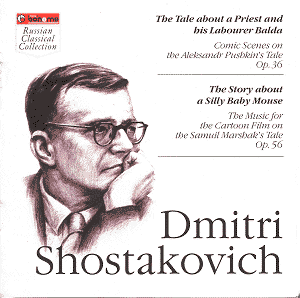 Composer: Dmitri Shostakovich
Composer: Dmitri Shostakovich
Works: The Tale about a Priest and his Labourer Balda, op. 36; The Story about a Silly Baby Mouse, op. 56
Performers: Choir and Symphony Orchestra of the St Petersburg Small Opera and Theatre/Valentin Kozhin; Symphony Orchestra of the Opera Class of the St Petersburg Conservatoire/Boris Tiles
Recording: Recorded in the St Petersburg Recording Studio; dating unclear
Label: BOHEME MUSIC CDBMR 012192
Dmitri Shostakovich’s oeuvre, with its rich tapestry woven from the threads of personal and political strife, is further enriched by the delightful, lesser-known works presented in this recording. The two scores, created for animated films, serve as an intriguing contrast to his more serious symphonic output. “The Tale about a Priest and his Labourer Balda,” based on Alexander Pushkin’s narrative, was originally penned in 1934 but subsequently lost. The present recording raises questions regarding its lineage, possibly reflecting an adaptation for a ballet first performed in 1999. Despite these uncertainties, what emerges is a work that encapsulates Shostakovich’s remarkable ability to blend whimsy with emotional depth.
The performances by the Choir and Symphony Orchestra of the St Petersburg Small Opera and Theatre under Valentin Kozhin, alongside the Symphony Orchestra of the Opera Class of the St Petersburg Conservatoire conducted by Boris Tiles, are commendable in their execution. The orchestral color is particularly striking in the 17 movements of “Balda,” showcasing Shostakovich’s astounding versatility. For instance, the twelfth movement—a quirky duet for saxophone and guitar—interjects a playful bassoon grotesquerie before transitioning into a poignant soprano solo, exemplifying the composer’s deft handling of contrasting timbres and moods. The musicians deliver these shifts with aplomb, balancing the comedic elements with the poignancy that often lurks beneath the surface.
The “Silly Baby Mouse,” a shorter work from 1939, similarly revels in a light-hearted charm while hinting at Shostakovich’s signature emotional complexity. The vocal lines are beautifully rendered, maintaining clarity amidst the orchestral backdrop. Although the original film never saw the light of day, the music itself stands strong, conveying narrative through sound even without a visual counterpart. The orchestra’s technical precision allows each musical phrase to resonate, creating a vivid auditory experience that draws the listener in.
The sound engineering of this recording is excellent, capturing the nuances of both orchestras with clarity and warmth. The balance between voices and instruments is carefully managed, allowing the intricate textures of Shostakovich’s writing to shine. While there may not be extensive competition within the realm of his light music, this recording stands out for its spirited interpretations and the quality of the performances.
The seamless interplay of humor and pathos in these works underscores the genius of Shostakovich, who, even amid political turmoil, could craft music that is not only entertaining but also deeply reflective. This recording offers a delightful glimpse into a different facet of his artistry—one that is often overshadowed by his more monumental compositions. For admirers of Shostakovich, this disc is an indispensable addition, revealing the composer’s extraordinary range and the joy he found in creation.



